SANGOMAS are traditional healers and diviners who intercede with the ancestors on behalf of their communities. In assessing Africa’s prospects for this year, it is important to interpret the bones of the sangoma.
Starting in Southern Africa, SA accounts for 60% of the subregion’s economy, but the "rainbow nation" is no longer at ease. The rand continues to plummet and growth is anaemic, and there are sporadic power cuts, service-delivery and student protests, as well as labour unrest.
The local government elections in May will be hotly contested, with the African National Congress (ANC) desperately trying to hang on to Johannesburg, Tshwane and Nelson Mandela Bay.
Any losses could further weaken a vulnerable President Jacob Zuma, whose recent bungling of the appointment of a finance minister inflicted potentially irreparable political damage. The contest to succeed him as ANC president next year will also heat up as his ex-wife, Nkosazana Dlamini-Zuma, is expected to step down as chairwoman of the African Union (AU) Commission at the end of her four-year term to challenge Deputy President Cyril Ramaphosa for the presidency.
Elsewhere, oil-rich Angola, with 20% of the subregional economy, will continue to suffer the negative economic effect of low oil prices. Potential instability will also need to be closely monitored in Lesotho, Swaziland, Mozambique and Zimbabwe.
Elections in neighbouring Zambia will see Edgar Lungu trying to cling to power amid falling copper prices.
In West Africa, Nigeria accounts for 80% of the economy and about half of the population. President Muhammadu Buhari will have to manage low oil prices and a falling naira. His three priorities will continue to be: vanquishing Boko Haram’s murderous nihilism; pursuing his relentless anticorruption campaign; and rebuilding the country’s infrastructure. This year should finally see the first visit to Nigeria of the first black US president, Barack Obama, on his farewell tour of Africa.
Stability will be critical in Ghana, which holds polls that could be the most hotly contested in decades. Elections will also take place in Niger, Benin, Cape Verde and Gambia. Peacekeepers will continue to be needed in Liberia, Mali and Guinea-Bissau.
Ethiopia and Kenya remain East Africa’s giants, with about 27% each of the subregion’s economy. Ethiopia’s government remains repressive, although it has built infrastructure at home and kept peace abroad. Kenya’s Uhuru Kenyatta will continue his anticorruption drive to win back disillusioned voters.
Burundi will continue its downward spiral after Pierre Nkurunziza’s constitutionally questionable third-term electoral victory, while Rwanda’s tyrannical Paul Kagame has formally removed presidential term limits. Uganda’s Yoweri Museveni will similarly extend his own 30-year rule in elections next month.
In Central Africa, despite its two-decade conflict, the Democratic Republic of the Congo (DRC) still accounts for 34% of the subregional economy.
President Joseph Kabila is toying with a strategy of "glissage" (slippage) to extend his 14-year rule by possibly postponing polls scheduled for November.
In other elections this year, Chad’s autocratic Idriss Déby will bulldoze his way to a fifth presidential term, as will both Equatorial Guinea’s 73-year-old Teodoro Obiang Nguema Mbasogo, who has ruled for 36 years, and Congo-Brazzaville’s Denis Sassou Nguesso, who shot his way to power in 1997 after an earlier 13-year rule. Gabon’s Ali Bongo Ondimba should also triumph in polls this year by means foul or fair.
Finally, in North Africa, Egypt accounts for 40% of the subregional economy, while Algeria has a 24% share. Egypt’s military strongman, Abdel Fattah al-Sisi, will continue to rule as a pharaoh, clamping down on democratic freedoms. This will, however, not resolve problems such as a falling pound, declining tourist numbers and increasing unemployment.
There will be continuing concerns about Algeria’s ailing 78-year-old President Abdelaziz Bouteflika, even as le pouvoir (a shadowy clique of powerful securocrats and civilians) watches the situation carefully amid a falling dinar, low oil prices and threats of terrorist instability.
This year, however, could see the election of the first North African to chair the AU Commission. If Dlamini-Zuma leaves the post, as expected, Algerian foreign minister Ramtane Lamamra is one of the favourites to replace her.
Anarchic Libya and fragile Tunisia will also need to be closely watched.
• Dr Adebajo is executive director of the Centre for Conflict Resolution in Cape Town, and visiting professor at the University of Johannesburg
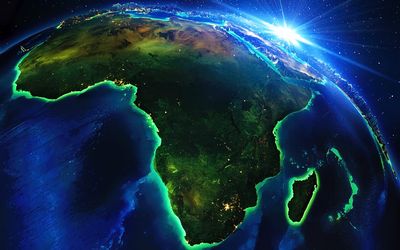
SA accounts for 60% of the subregion’s economy, but the 'rainbow nation' is no longer at ease, says the writer. Picture: ISTOCK
SANGOMAS are traditional healers and diviners who intercede with the ancestors on behalf of their communities. In assessing Africa’s prospects for this year, it is important to interpret the bones of the sangoma.
Starting in Southern Africa, SA accounts for 60% of the subregion’s economy, but the "rainbow nation" is no longer at ease. The rand continues to plummet and growth is anaemic, and there are sporadic power cuts, service-delivery and student protests, as well as labour unrest.
The local government elections in May will be hotly contested, with the African National Congress (ANC) desperately trying to hang on to Johannesburg, Tshwane and Nelson Mandela Bay.
Any losses could further weaken a vulnerable President Jacob Zuma, whose recent bungling of the appointment of a finance minister inflicted potentially irreparable political damage. The contest to succeed him as ANC president next year will also heat up as his ex-wife, Nkosazana Dlamini-Zuma, is expected to step down as chairwoman of the African Union (AU) Commission at the end of her four-year term to challenge Deputy President Cyril Ramaphosa for the presidency.
Elsewhere, oil-rich Angola, with 20% of the subregional economy, will continue to suffer the negative economic effect of low oil prices. Potential instability will also need to be closely monitored in Lesotho, Swaziland, Mozambique and Zimbabwe.
Elections in neighbouring Zambia will see Edgar Lungu trying to cling to power amid falling copper prices.
In West Africa, Nigeria accounts for 80% of the economy and about half of the population. President Muhammadu Buhari will have to manage low oil prices and a falling naira. His three priorities will continue to be: vanquishing Boko Haram’s murderous nihilism; pursuing his relentless anticorruption campaign; and rebuilding the country’s infrastructure. This year should finally see the first visit to Nigeria of the first black US president, Barack Obama, on his farewell tour of Africa.
Stability will be critical in Ghana, which holds polls that could be the most hotly contested in decades. Elections will also take place in Niger, Benin, Cape Verde and Gambia. Peacekeepers will continue to be needed in Liberia, Mali and Guinea-Bissau.
Ethiopia and Kenya remain East Africa’s giants, with about 27% each of the subregion’s economy. Ethiopia’s government remains repressive, although it has built infrastructure at home and kept peace abroad. Kenya’s Uhuru Kenyatta will continue his anticorruption drive to win back disillusioned voters.
Burundi will continue its downward spiral after Pierre Nkurunziza’s constitutionally questionable third-term electoral victory, while Rwanda’s tyrannical Paul Kagame has formally removed presidential term limits. Uganda’s Yoweri Museveni will similarly extend his own 30-year rule in elections next month.
In Central Africa, despite its two-decade conflict, the Democratic Republic of the Congo (DRC) still accounts for 34% of the subregional economy.
President Joseph Kabila is toying with a strategy of "glissage" (slippage) to extend his 14-year rule by possibly postponing polls scheduled for November.
In other elections this year, Chad’s autocratic Idriss Déby will bulldoze his way to a fifth presidential term, as will both Equatorial Guinea’s 73-year-old Teodoro Obiang Nguema Mbasogo, who has ruled for 36 years, and Congo-Brazzaville’s Denis Sassou Nguesso, who shot his way to power in 1997 after an earlier 13-year rule. Gabon’s Ali Bongo Ondimba should also triumph in polls this year by means foul or fair.
Finally, in North Africa, Egypt accounts for 40% of the subregional economy, while Algeria has a 24% share. Egypt’s military strongman, Abdel Fattah al-Sisi, will continue to rule as a pharaoh, clamping down on democratic freedoms. This will, however, not resolve problems such as a falling pound, declining tourist numbers and increasing unemployment.
There will be continuing concerns about Algeria’s ailing 78-year-old President Abdelaziz Bouteflika, even as le pouvoir (a shadowy clique of powerful securocrats and civilians) watches the situation carefully amid a falling dinar, low oil prices and threats of terrorist instability.
This year, however, could see the election of the first North African to chair the AU Commission. If Dlamini-Zuma leaves the post, as expected, Algerian foreign minister Ramtane Lamamra is one of the favourites to replace her.
Anarchic Libya and fragile Tunisia will also need to be closely watched.
• Dr Adebajo is executive director of the Centre for Conflict Resolution in Cape Town, and visiting professor at the University of Johannesburg


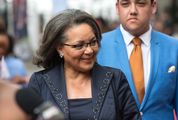
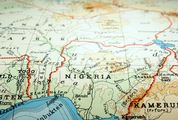
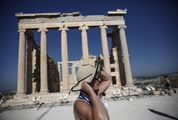
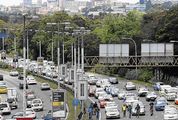




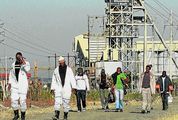










Change: -0.95%
Change: -1.26%
Change: -1.23%
Change: -0.89%
Change: -2.34%
Data supplied by Profile Data
Change: -0.39%
Change: -1.29%
Change: -0.95%
Change: 0.00%
Change: -1.56%
Data supplied by Profile Data
Change: 0.42%
Change: 0.34%
Change: 0.98%
Change: 0.87%
Change: -0.58%
Data supplied by Profile Data
Change: 0.00%
Change: 0.00%
Change: 0.00%
Change: 0.00%
Change: 0.00%
Data supplied by Profile Data